Search Result
Results for "
dehydrating
" in MedChemExpress (MCE) Product Catalog:
7
Biochemical Assay Reagents
1
Isotope-Labeled Compounds
| Cat. No. |
Product Name |
Target |
Research Areas |
Chemical Structure |
-
- HY-D0178
-
|
|
Biochemical Assay Reagents
|
Others
|
|
1-(3-Dimethylaminopropyl)-3-ethylcarbodiimide hydrochloride is a carbodiimide reagent that can form nucleic acid and compounds with amide bonds. 1-(3-Dimethylaminopropyl)-3-ethylcarbodiimide hydrochloride accelerates the formation reaction of esters, amides, and peptides, as a condensing and dehydrating agent, which are often used for polynucleotide synthesis, anhydroxydation, lactonization and esterification .
|
-
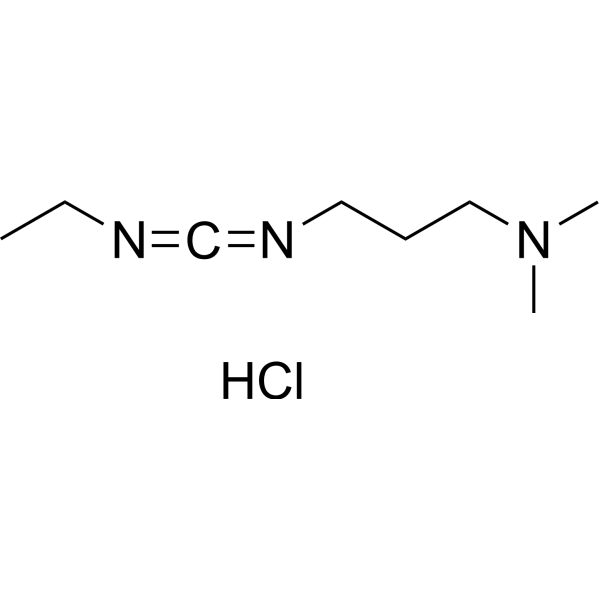
-
- HY-111974
-
|
ABA-GE; (S)-cis,trans-Abscisic acid glucosyl ester
|
Others
|
Endocrinology
|
|
β-D-Glucopyranosyl abscisate (ABA-GE) is a hydrolyzable abscisic acid (ABA) conjugate that accumulates in the vacuole and presumably also in the endoplasmic reticulum. The deconjugation of β-D-Glucopyranosyl abscisate allows the rapid formation of free ABA in response to abiotic stress conditions such as dehydration and salt stress. β-D-Glucopyranosyl abscisate contributes to the maintenance of ABA homeostasis .
|
-
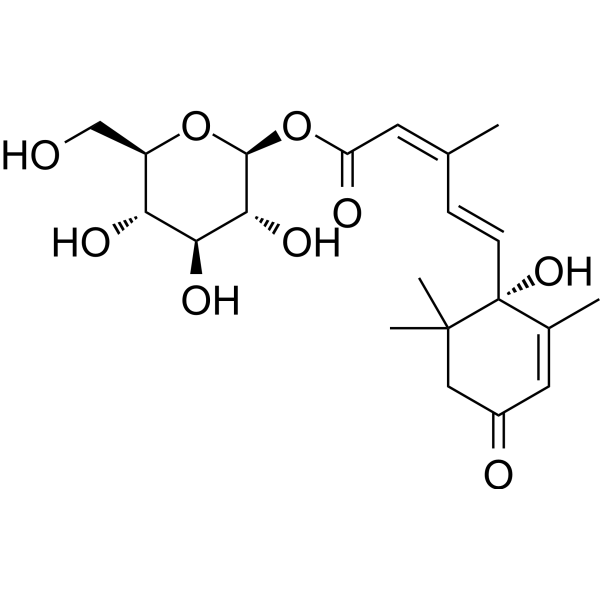
-
- HY-B1610
-
|
Trisodium citrate dihydrate; Citric acid trisodium salt dihydrate
|
Bacterial
Endogenous Metabolite
Apoptosis
|
Infection
Cardiovascular Disease
Cancer
|
|
Sodium citrate dehydrate (Trisodium citrate dihydrate) is a natural product with oral activity that can be found in citrus fruits. Sodium citrate dehydrate can inhibit the proliferation of tumor cells and induce apoptosis. Sodium citrate dehydrate has antibacterial, anti-tumor and antioxidant activities. Sodium citrate dehydrate can be prepared as a cosolvent or buffer .
|
-
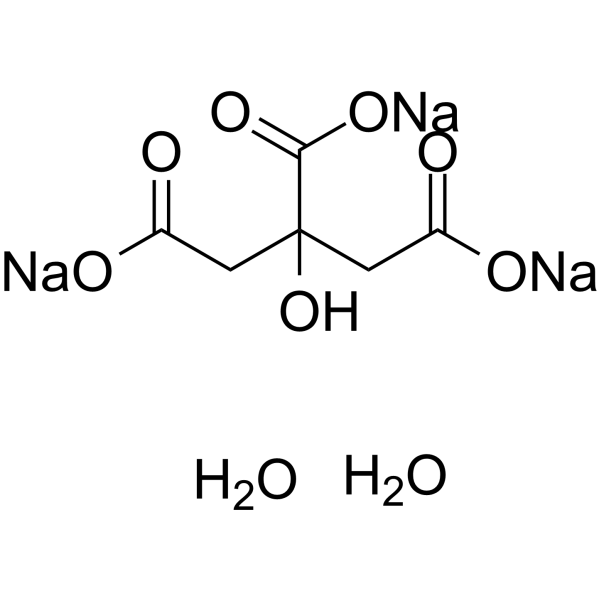
-
- HY-D0850
-
|
Sodium tartrate dibasic dihydrate; Sodium tartrate dihydrate
|
Phosphatase
Endogenous Metabolite
|
Cardiovascular Disease
|
|
Tartaric acid disodium dehydrate (L-(+) -tartaric acid) is an orally active weak organic acid that can be isolated from grapes. Tartaric acid disodium dehydrate has vasodilatory and antihypertensive effects. Tartaric acid disodium dehydrate can be used as flavorings and antioxidants in a range of foods and beverages. Tartaric acid disodium dehydrate can be used in laser frequency doubling and optical limiting applications .
|
-
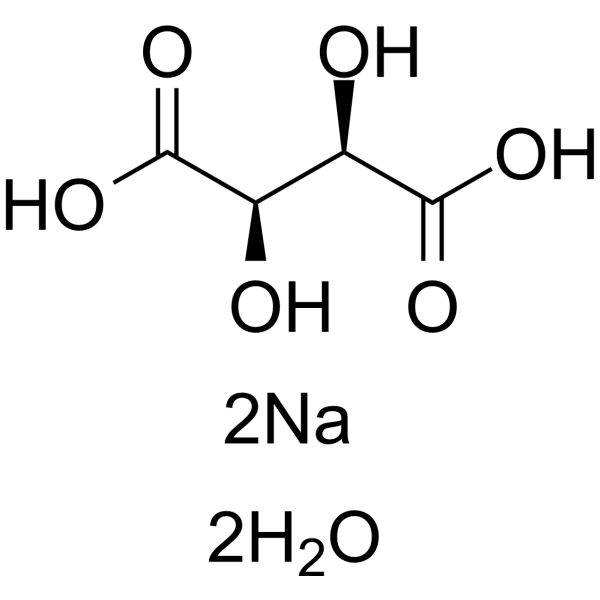
-
- HY-113461
-
|
|
Others
|
Others
|
|
13,14-Dihydro-15-keto-prostaglandin A2 is a product of the non-enzymatic dehydration of 13,14-dihydro-15-keto PGE2. It is further broken down into bicyclo PGE2, which acts as a biomarker for PGE2 synthesis .
|
-
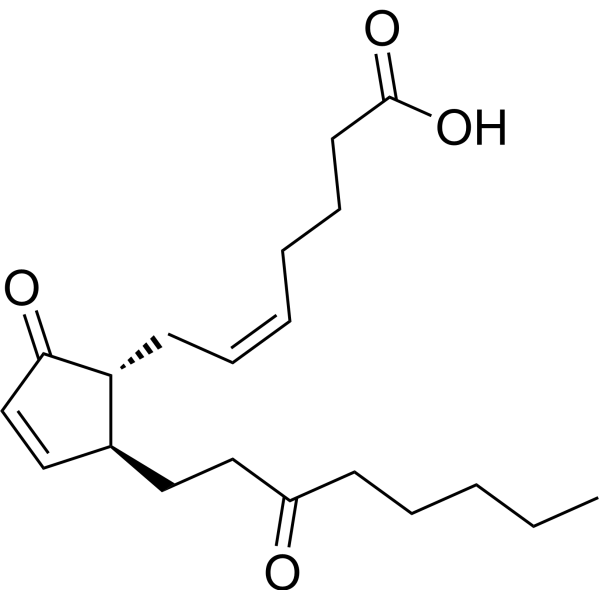
-
- HY-B1610H
-
|
Trisodium citrate dihydrate (Pharmaceutical primary standard, USP)
|
Biochemical Assay Reagents
|
Others
|
|
Sodium (Trisodium) citrate dehydrate is an antacid used in studies to neutralize gastric acid. Sodium citrate dehydrate can also be used to prepare biological buffers. Sodium citrate dehydrate is a reference standard grade of the United States Pharmacopeia (USP) and a first-class pharmaceutical standard .
|
-
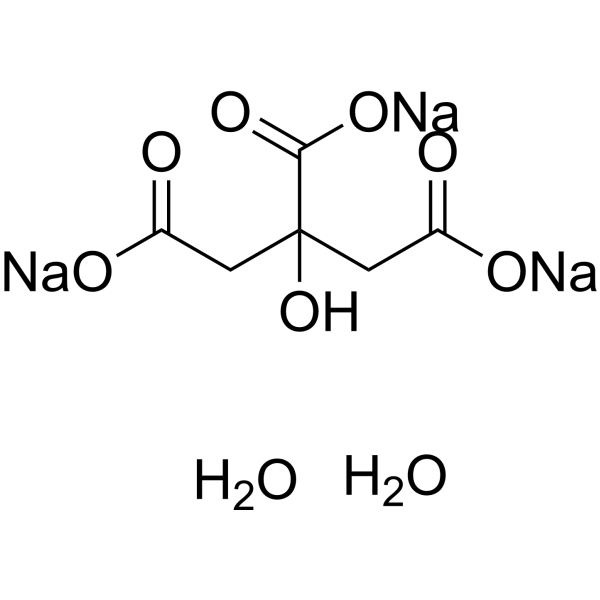
-
- HY-Y0682A
-
|
EDTA disodium dihydrate
|
Biochemical Assay Reagents
Bacterial
SOD
|
Cardiovascular Disease
Neurological Disease
|
|
Ethylenediaminetetraacetic acid (EDTA) disodium dehydrate is a kind of metal chelating agent (binds to bivalent and trivalent metal cations, including calcium). Ethylenediaminetetraacetic acid disodium dehydrate has antibacterial, anti-inflammatory, antioxidant, anti-hypercalcemia and anticoagulant activities. Ethylenediaminetetraacetic acid disodium dehydrate decreases the metal ion-catalyzed oxidative damage to proteins, and allows maintenance of reducing environment during protein purification. Ethylenediaminetetraacetic acid disodium dehydrate can alleviate the liver fibrosis. Ethylenediaminetetraacetic acid disodium dehydrate can be used for coronary artery disease and neural system disease research .
|
-
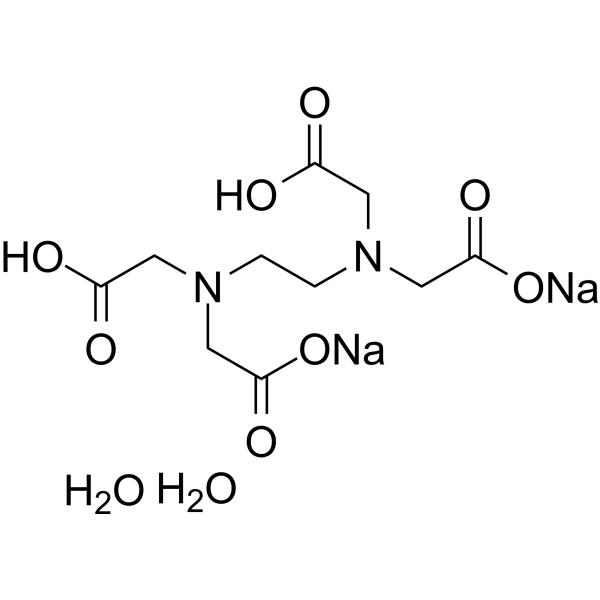
-
- HY-A0119
-
|
Sodium nitroprusside dihydrate; Sodium Nitroferricyanide(III) Dihydrate
|
Autophagy
|
Cardiovascular Disease
Cancer
|
|
Nitroprusside disodium dehydrate (Sodium nitroprusside dihydrate) is a vasodilator that available for the research of acute hypertension, heart failure. Nitroprusside disodium dehydrate induces autophagy in glutathione-depleted osteoblasts. Nitroprusside disodium dehydrate acts as a nitric oxide (NO) donor in a rat intestinal ischemia reperfusion model .
|
-
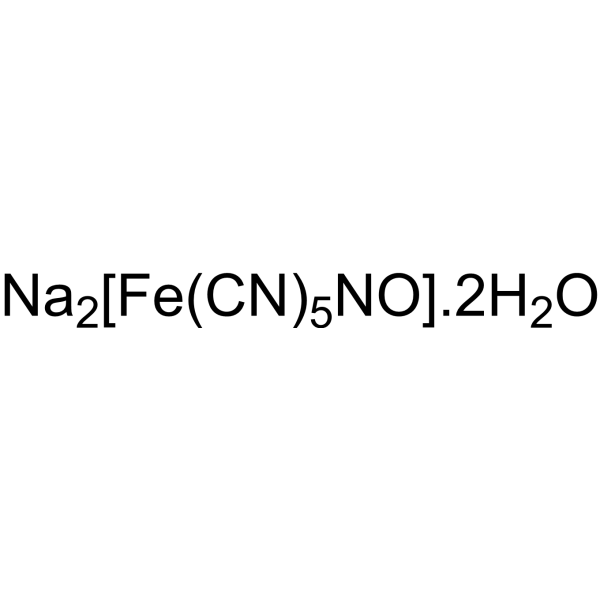
-
- HY-B1610I
-
|
Trisodium citrate dihydrate, for molecular biology
|
Biochemical Assay Reagents
|
Others
|
|
Sodium (Trisodium) citrate dehydrate is an antacid used in studies to neutralize gastric acid. Sodium citrate dehydrate is often used to prepare biological buffers and can be used in molecular biology research .
|
-
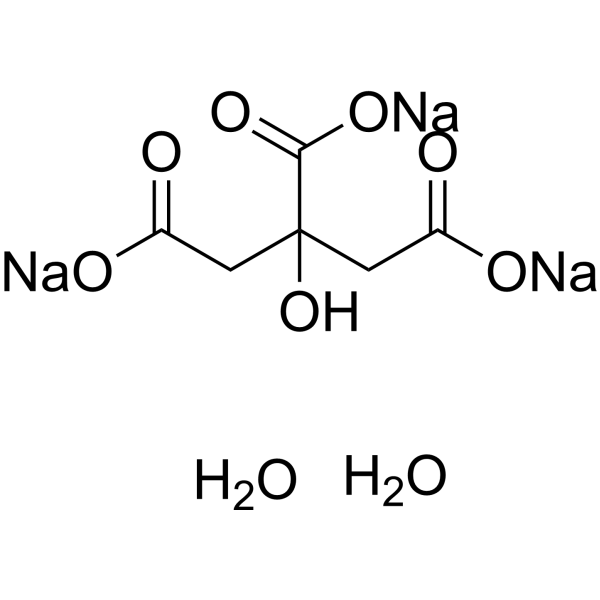
-
- HY-B0002A
-
|
GR 38032 hydrochloride dihydrate; SN 307 hydrochloride dihydrate
|
5-HT Receptor
|
Neurological Disease
|
|
Ondansetron (GR 38032) hydrochloride dehydrate is an orally active, highly selective and competitive 5-HT3 receptor antagonist (crosses the blood-brain barrier). Ondansetron hydrochloride dehydrate can be used in studies of preventing nausea and vomiting associated with cancer chemotherapy, radiation therapy and surgery .
|
-
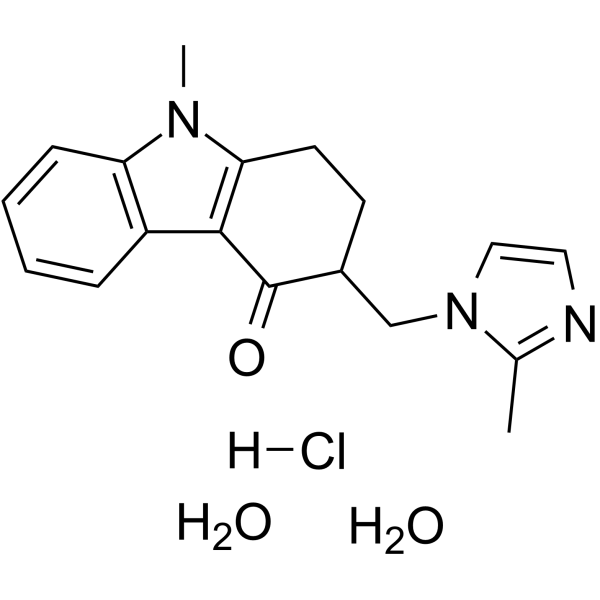
-
- HY-W016814
-
|
cis-Aconitic acid
|
Endogenous Metabolite
|
Others
|
|
(Z)-Aconitic acid (cis-Aconitic acid) is the cis-isomer of Aconitic acid. (Z)-Aconitic acid (cis-Aconitic acid) is an intermediate in the tricarboxylic acid cycle produced by the dehydration of citric acid.
|
-
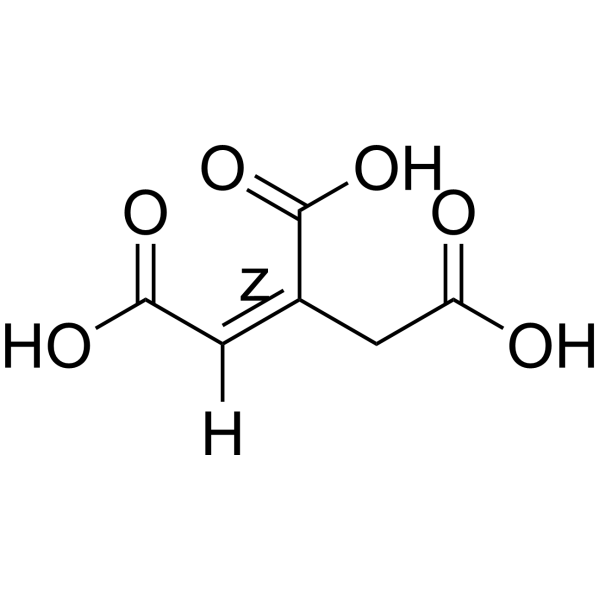
-
- HY-118548
-
|
|
Drug Metabolite
|
Endocrinology
|
|
Tetranor-PGAM is a tetranor-prostaglandin A metabolite. Tetranor-PGAM is a dehydration product of tetranor-PGEM (HY-114988). Tetranor-PGAM can be measured as a surrogate for tetranor-PGEM levels in urine .
|
-
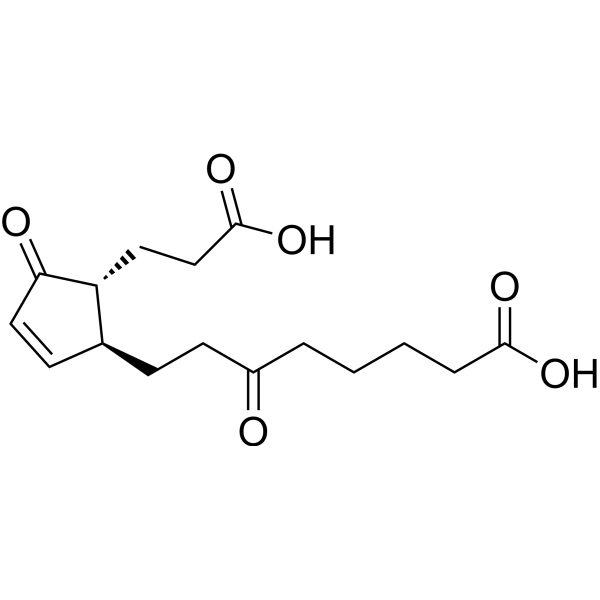
-
- HY-B0147B
-
|
Pefloxacinium mesylate dihydrate
|
Bacterial
Antibiotic
|
Infection
|
|
Pefloxacin mesylate dehydrate is a an antibacterial agent and prevents bacterial DNA replication by inhibiting DNA gyrase (topoisomerse)
Target: DNA gyrase
Pefloxacin is a synthetic chemotherapeutic agent used to treat severe and life-threatening bacterial infections.
|
-
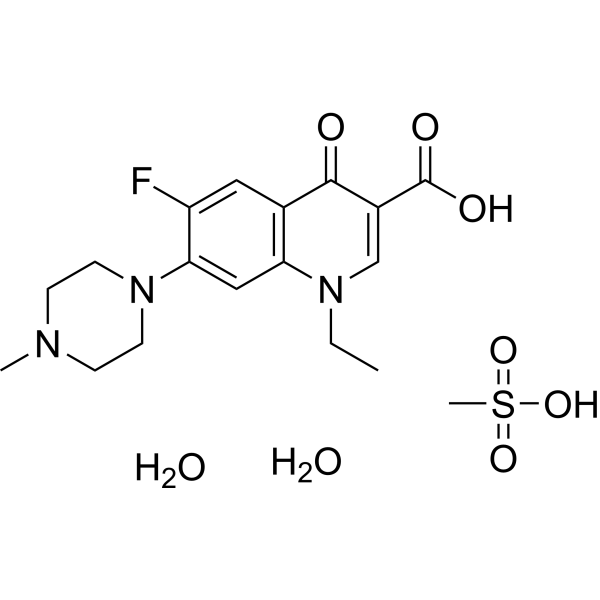
-
- HY-113053
-
-
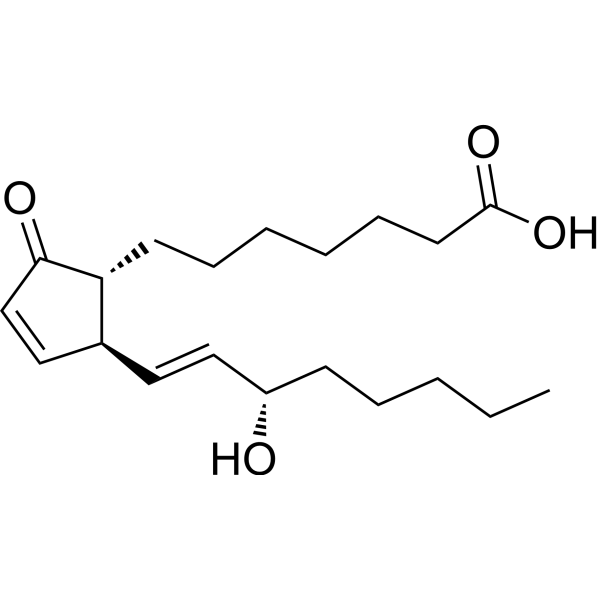
-
- HY-Y0543
-
|
|
|
|
|
5-Methylfurfural is a naturally occurring substance, found in cigarette smoke condensate, licorice essential oil, stored dehydrated orange powder, baked potato flour, volatile compounds of roast beef, aroma concentrate of sponge cake. bread and in coffee, tea and cocoa . A flavoring agent.
|
-
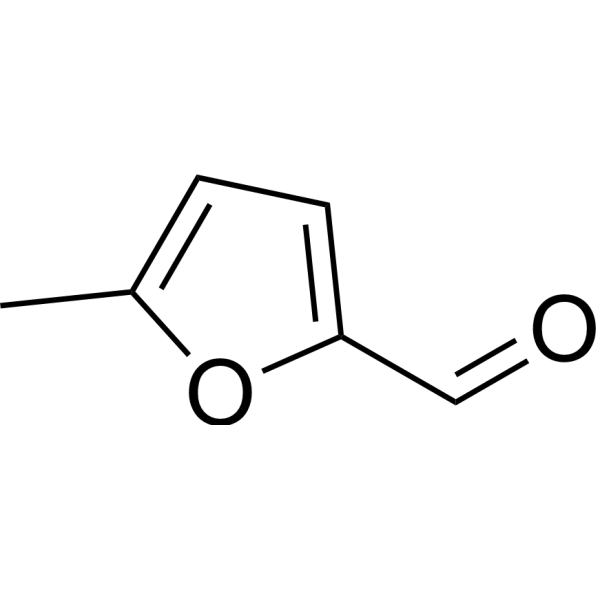
-
- HY-W127628
-
|
|
Biochemical Assay Reagents
|
Others
|
|
Decyl β-D-glucopyranoside is a nonionic surfactant commonly used in biochemical and molecular biology research. It can be used for the extraction, purification and structural analysis of cell membranes, and is widely used in the fields of proteomics and genetic engineering. In addition, this compound is also used as an auxiliary reagent and dehydrating agent in some biochemical experiments.
|
-
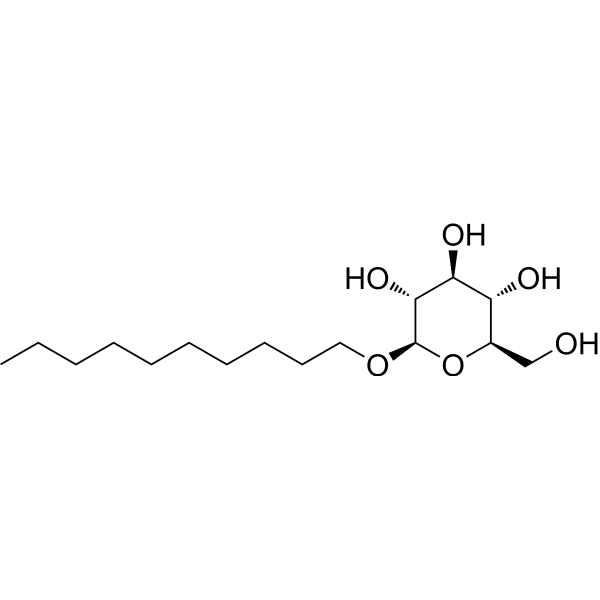
-
- HY-W016814S
-
|
cis-Aconitic acid-13C6
|
Isotope-Labeled Compounds
|
Others
|
|
(Z)-Aconitic acid- 13C6 is the 13C-labeled (Z)-Aconitic acid (HY-W016814). (Z)-Aconitic acid- 13C6 (cis-Aconitic acid) is the cis-isomer of Aconitic acid. (Z)-Aconitic acid- 13C6 (cis-Aconitic acid) is an intermediate in the tricarboxylic acid cycle produced by the dehydration of citric acid.
|
-
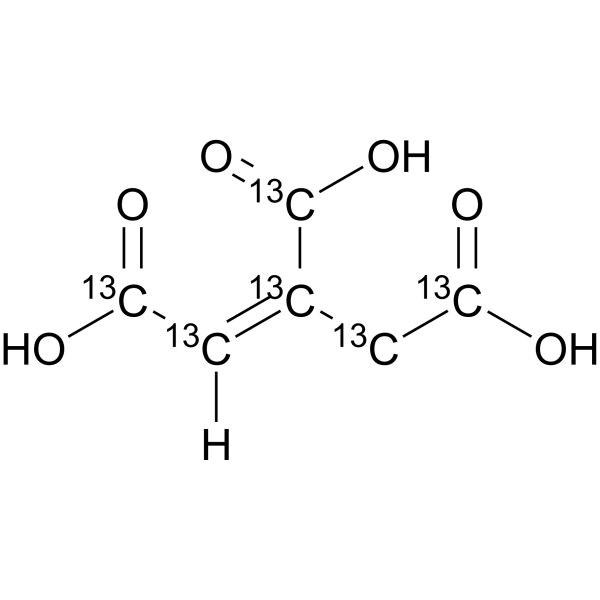
-
- HY-50694
-
Senicapoc
Maximum Cited Publications
11 Publications Verification
ICA-17043
|
Potassium Channel
|
Others
|
|
Senicapoc (ICA-17043) is a potent and selective Gardos channel (Ca 2+-activated K + channel; KCa3.1) blocker with an IC50 of 11 nM. Senicapoc blocks Ca 2+-induced rubidium flux from human RBCs with an IC50 value of 11 nM and inhibits RBC dehydration with IC50 of 30 nM .
|
-
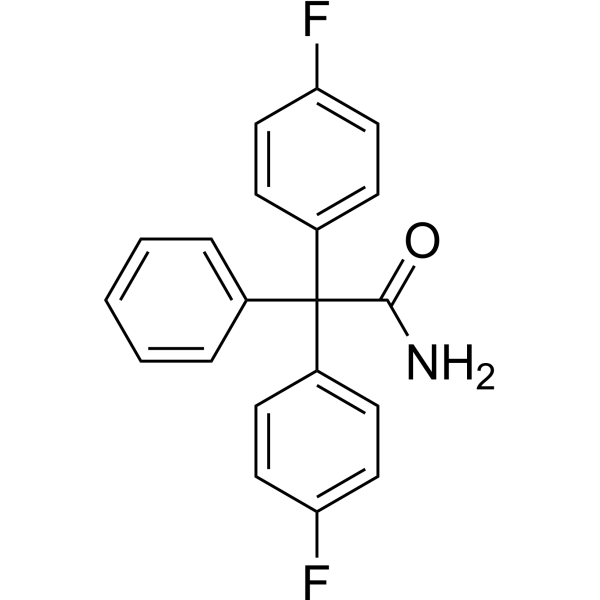
-
- HY-114822
-
|
PGA3
|
Prostaglandin Receptor
PPAR
|
Endocrinology
|
|
Prostaglandin A3 is a non-enzymatic dehydration product of prostaglandin E3 (PGE3). Prostaglandin A3 showed good affinity for canine EP2 and EP4 receptors with IC50 values of 120 and 20 nM, respectively. The Ki value of Prostaglandin A3 for human PPARγ was 188 μM .
|
-
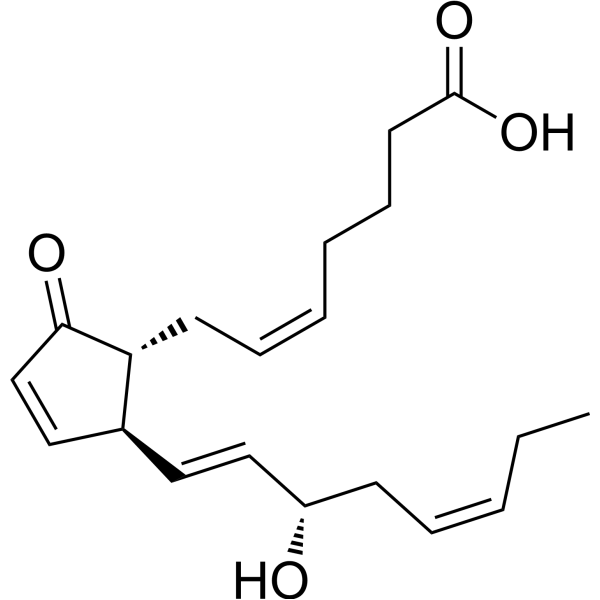
-
- HY-B0189B
-
|
TAK-370 citrate dihydrate; AS-4370 citrate dihydrate
|
5-HT Receptor
Potassium Channel
Cytochrome P450
|
Metabolic Disease
|
|
Mosapride (TAK-370) citrate dehydrate is a gastroprokinetic agent with 5-hydroxytryptamine4 receptor agonist activity and has been widely used in the research of a variety of gastrointestinal disorders. Mosapride citrate dihydrate potently inhibits Kv4.3 in a concentration-dependent manner with IC50 values of 15.2 μM . Mosapride citrate dihydrateselectively stimulates upper GI motility in vivo .
|
-
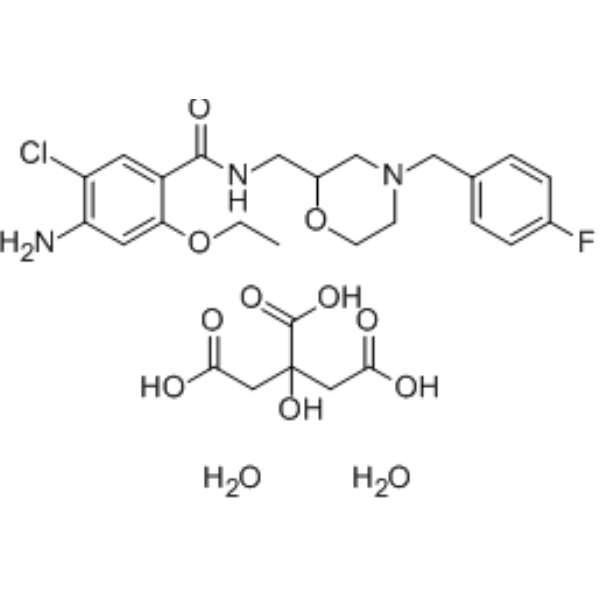
-
- HY-113505
-
|
Δ12-PGJ2
|
Endogenous Metabolite
Apoptosis
|
Cancer
|
|
Delta-12-Prostaglandin J2 (Δ12-PGJ2) is a cyclopentenone prostaglandin (PG) with anti-proliferative effect on various tumor cell growth. Delta-12-Prostaglandin J2, a naturally occurring dehydration product of prostaglandin D2, is able to induce apoptosis in HeLa cells via caspase activation .
|
-
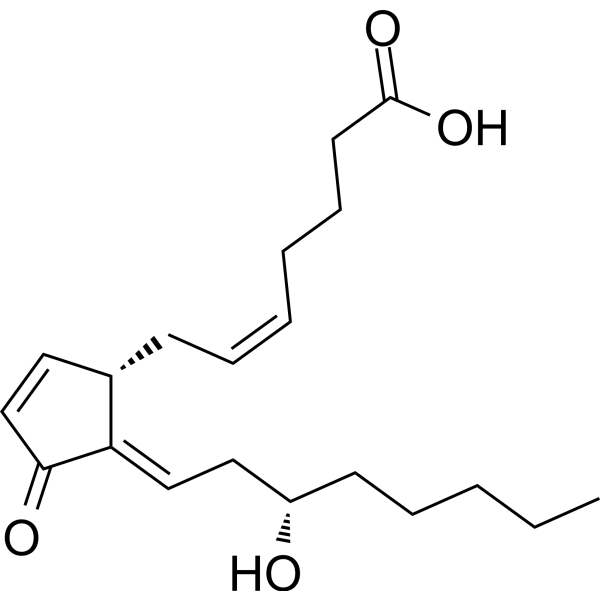
-
- HY-141582
-
|
N-Stearoyl phytosphingosine
|
Biochemical Assay Reagents
|
Others
|
|
C18 Phytoceramide (t18:0/18:0) (Cer(t18:0/18:0)) is a bioactive sphingolipid found in the stratum corneum of Saccharomyces cerevisiae, wheat grain, and mammalian epidermis. Cer(t18:0/18:0) consists of a phytosphingosine backbone amine linked to a C18 fatty acid chain. Cer(t18:0/18:0) has the function of regulating apoptosis, cell differentiation, proliferation of smooth muscle cells and inhibition of mitochondrial respiratory chain. It also suppresses the expression of allergic cytokines IL-4, TNF-α, and transcription factors c-Jun and NF-κB in histone-stimulated mouse skin tissue. Formulations containing cer(t18:0/18:0) have been used as skin protectants in cosmetics as they reduce water loss and prevent epidermal dehydration and irritation.
|
-
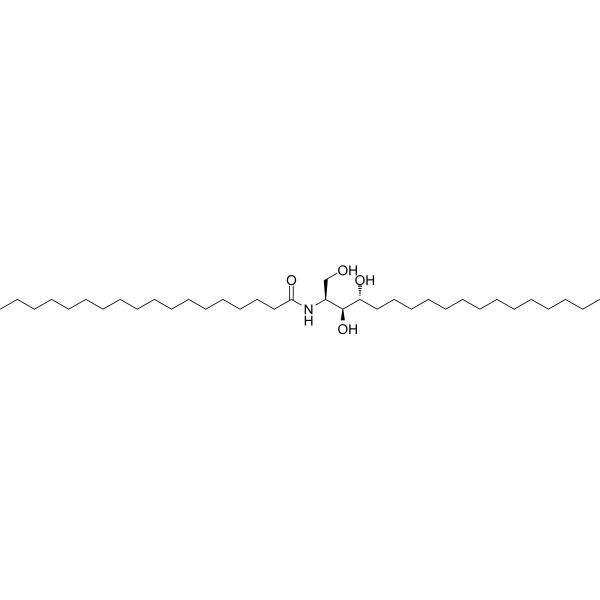
-
- HY-B1075
-
|
MK-0955 calcium
|
Bacterial
Antibiotic
|
Infection
Cancer
|
|
Fosfomycin (MK-0955) calcium is a blood-brain barrier penetrating, broad-spectrum antibiotic by irreversibly inhibiting an early stage in cell wall synthesis. Fosfomycin calcium shows both in vivo and in vitro activity against a wide range of bacteria, including multidrug-resistant (MDR), extensively drug-resistant (XDR), and pan-drug-resistant (PDR) bacteria .
|
-
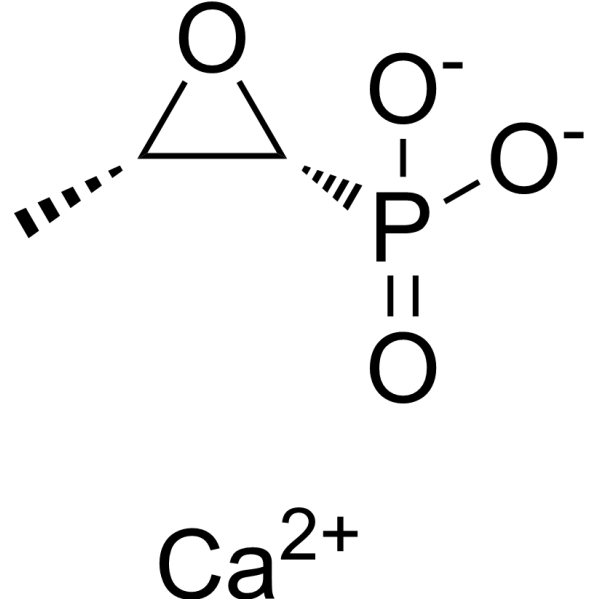
-
- HY-B0609
-
|
MK-0955 tromethamine
|
Bacterial
Antibiotic
|
Infection
Cancer
|
|
Fosfomycin (MK-0955) tromethamine is a blood-brain barrier penetrating, broad-spectrum antibiotic by irreversibly inhibiting an early stage in cell wall synthesis. Fosfomycin tromethamine shows both in vivo and in vitro activity against a wide range of bacteria, including multidrug-resistant (MDR), extensively drug-resistant (XDR), and pan-drug-resistant (PDR) bacteria .
|
-
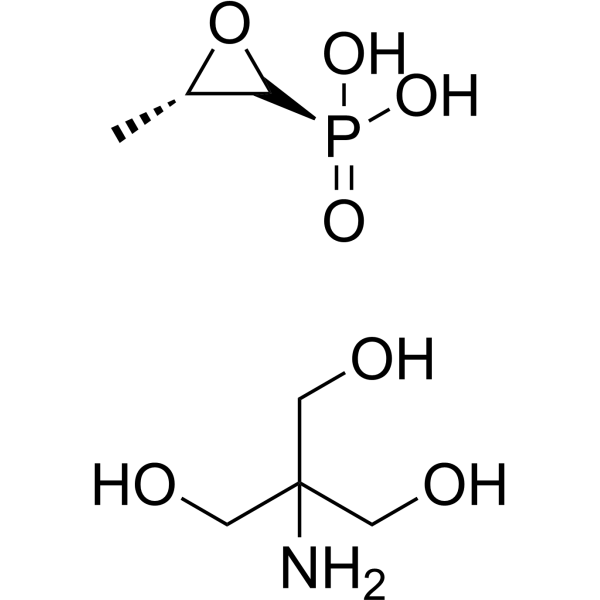
-
- HY-W016420
-
|
MK-0955 sodium
|
Bacterial
Antibiotic
|
Infection
Cancer
|
|
Fosfomycin (MK-0955) sodium is a blood-brain barrier penetrating, broad-spectrum antibiotic by irreversibly inhibiting an early stage in cell wall synthesis. Fosfomycin sodium shows both in vivo and in vitro activity against a wide range of bacteria, including multidrug-resistant (MDR), extensively drug-resistant (XDR), and pan-drug-resistant (PDR) bacteria .
|
-
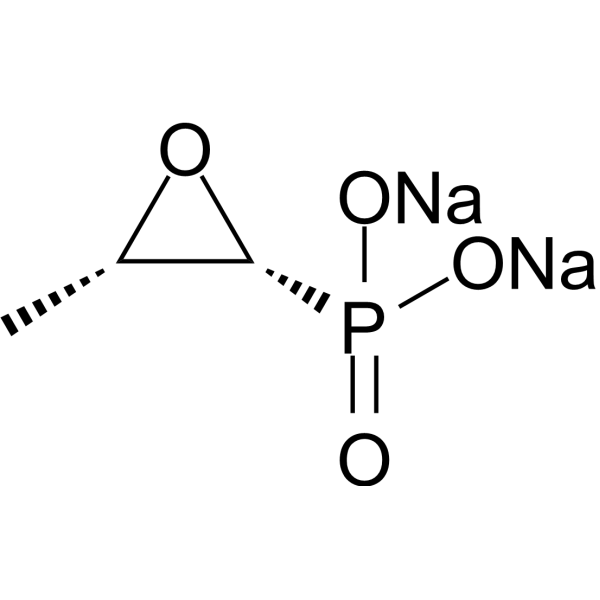
-
- HY-B1075A
-
|
MK-0955
|
Bacterial
Antibiotic
|
Infection
|
|
Fosfomycin (MK-0955) is a broad-spectrum antibiotic. Fosfomycin can cross blood-brain barrier penetrating, and irreversibly inhibits an early stage in cell wall synthesis. Fosfomycin shows anti-bacteria activity for a range of bacteria, including multidrug-resistant (MDR), extensively drug-resistant (XDR), and pan-drug-resistant (PDR) bacteria .
|
-
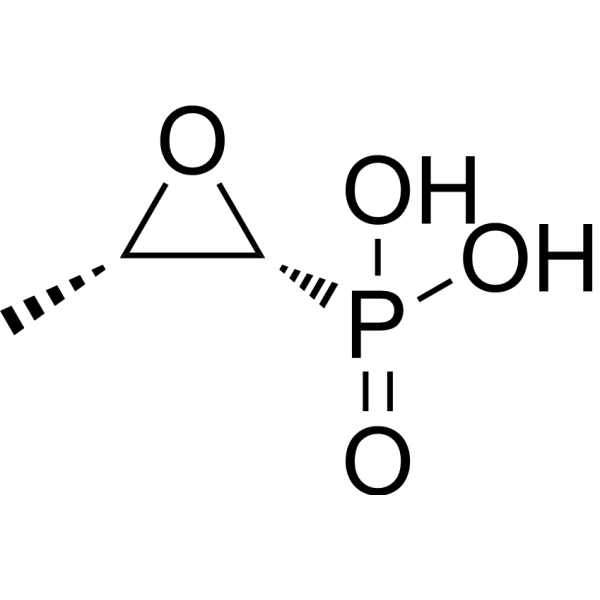
| Cat. No. |
Product Name |
Type |
-
- HY-D0178
-
|
|
Biochemical Assay Reagents
|
|
1-(3-Dimethylaminopropyl)-3-ethylcarbodiimide hydrochloride is a carbodiimide reagent that can form nucleic acid and compounds with amide bonds. 1-(3-Dimethylaminopropyl)-3-ethylcarbodiimide hydrochloride accelerates the formation reaction of esters, amides, and peptides, as a condensing and dehydrating agent, which are often used for polynucleotide synthesis, anhydroxydation, lactonization and esterification .
|
-
- HY-D0850
-
|
Sodium tartrate dibasic dihydrate; Sodium tartrate dihydrate
|
Biochemical Assay Reagents
|
|
Tartaric acid disodium dehydrate (L-(+) -tartaric acid) is an orally active weak organic acid that can be isolated from grapes. Tartaric acid disodium dehydrate has vasodilatory and antihypertensive effects. Tartaric acid disodium dehydrate can be used as flavorings and antioxidants in a range of foods and beverages. Tartaric acid disodium dehydrate can be used in laser frequency doubling and optical limiting applications .
|
-
- HY-Y0682A
-
|
EDTA disodium dihydrate
|
Biochemical Assay Reagents
|
|
Ethylenediaminetetraacetic acid (EDTA) disodium dehydrate is a kind of metal chelating agent (binds to bivalent and trivalent metal cations, including calcium). Ethylenediaminetetraacetic acid disodium dehydrate has antibacterial, anti-inflammatory, antioxidant, anti-hypercalcemia and anticoagulant activities. Ethylenediaminetetraacetic acid disodium dehydrate decreases the metal ion-catalyzed oxidative damage to proteins, and allows maintenance of reducing environment during protein purification. Ethylenediaminetetraacetic acid disodium dehydrate can alleviate the liver fibrosis. Ethylenediaminetetraacetic acid disodium dehydrate can be used for coronary artery disease and neural system disease research .
|
-
- HY-B1610H
-
|
Trisodium citrate dihydrate (Pharmaceutical primary standard, USP)
|
Biochemical Assay Reagents
|
|
Sodium (Trisodium) citrate dehydrate is an antacid used in studies to neutralize gastric acid. Sodium citrate dehydrate can also be used to prepare biological buffers. Sodium citrate dehydrate is a reference standard grade of the United States Pharmacopeia (USP) and a first-class pharmaceutical standard .
|
-
- HY-B1610I
-
|
Trisodium citrate dihydrate, for molecular biology
|
Biochemical Assay Reagents
|
|
Sodium (Trisodium) citrate dehydrate is an antacid used in studies to neutralize gastric acid. Sodium citrate dehydrate is often used to prepare biological buffers and can be used in molecular biology research .
|
-
- HY-W127628
-
|
|
Biochemical Assay Reagents
|
|
Decyl β-D-glucopyranoside is a nonionic surfactant commonly used in biochemical and molecular biology research. It can be used for the extraction, purification and structural analysis of cell membranes, and is widely used in the fields of proteomics and genetic engineering. In addition, this compound is also used as an auxiliary reagent and dehydrating agent in some biochemical experiments.
|
-
- HY-141582
-
|
N-Stearoyl phytosphingosine
|
Biochemical Assay Reagents
|
|
C18 Phytoceramide (t18:0/18:0) (Cer(t18:0/18:0)) is a bioactive sphingolipid found in the stratum corneum of Saccharomyces cerevisiae, wheat grain, and mammalian epidermis. Cer(t18:0/18:0) consists of a phytosphingosine backbone amine linked to a C18 fatty acid chain. Cer(t18:0/18:0) has the function of regulating apoptosis, cell differentiation, proliferation of smooth muscle cells and inhibition of mitochondrial respiratory chain. It also suppresses the expression of allergic cytokines IL-4, TNF-α, and transcription factors c-Jun and NF-κB in histone-stimulated mouse skin tissue. Formulations containing cer(t18:0/18:0) have been used as skin protectants in cosmetics as they reduce water loss and prevent epidermal dehydration and irritation.
|
| Cat. No. |
Product Name |
Category |
Target |
Chemical Structure |
| Cat. No. |
Product Name |
Chemical Structure |
-
- HY-W016814S
-
|
|
|
(Z)-Aconitic acid- 13C6 is the 13C-labeled (Z)-Aconitic acid (HY-W016814). (Z)-Aconitic acid- 13C6 (cis-Aconitic acid) is the cis-isomer of Aconitic acid. (Z)-Aconitic acid- 13C6 (cis-Aconitic acid) is an intermediate in the tricarboxylic acid cycle produced by the dehydration of citric acid.
|
-

Your information is safe with us. * Required Fields.
Inquiry Information
- Product Name:
- Cat. No.:
- Quantity:
- MCE Japan Authorized Agent:


































